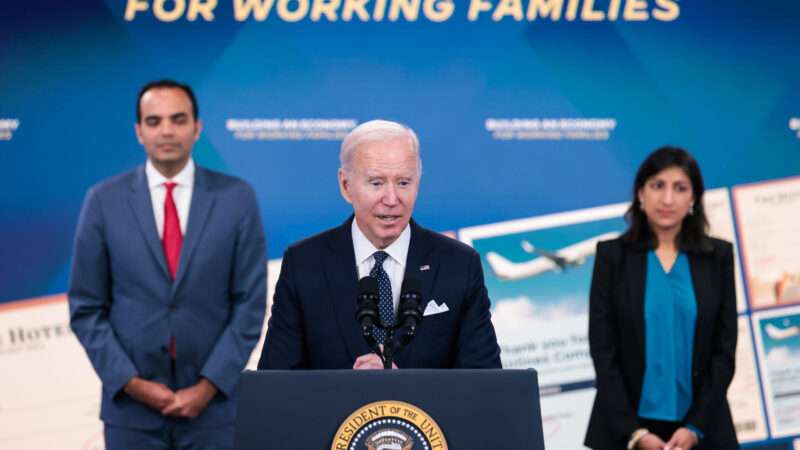
The ostensible purpose of antitrust policy is to promote healthy competition in the marketplace, but antitrust enforcement has largely protected inefficient firms from the threat of competition and deprived consumers of the lower prices they would otherwise enjoy. Thanks to legal scholars like Robert Bork, antitrust enforcement over the past four decades has primarily focused on the most logical place—maximizing benefits for consumers. But Democrats are taking a radical turn from Bork's philosophy by reviving a nearly 90-year-old price discrimination law known as the Robinson-Patman Act, making discounts to lower prices illegal. To strengthen your family's purchasing power, the Robinson-Patman Act should be repealed.
At a press conference in 2021, President Joe Biden called for "full and aggressive enforcement" of archaic antitrust laws against private industry. "Forty years ago, we chose the wrong path, in my view," said Biden, "following the misguided philosophy of people like Robert Bork." Now, instead of protecting consumers, the Federal Trade Commission (FTC) is determined to scapegoat well-run businesses to divert blame away from Biden for his own inflationary policies.
In a January 2022 article, The Washington Post revealed that several Democratic pollsters urged senior White House officials for months to find "a villain or an explanation" for inflation as the president's economic approval ratings declined.
Since then, FTC Chair Lina Khan initiated investigations into the practices of the pharmaceutical, soft drink, and alcohol industries citing the Robinson-Patman Act. Congress enacted the Depression-era law to prevent larger retailers from receiving more significant discounts than smaller competitors. The Robinson-Patman Act prevents sellers from charging retailers different prices if enforcers felt discounts would "injure competition."
Today's sudden appreciation of the Robinson-Patman Act is a reversal of long-standing suspicion of the usefulness and wisdom of the law. The Department of Justice (DOJ) and the FTC have not enforced the act in decades because it relied on outdated economic assumptions. A 1977 report from the DOJ found that the Robinson-Patman Act raised consumer prices and harmed consumer welfare. The report went as far as to say that "serious consideration should be given to repealing the Robinson-Patman Act." In 2007, the congressionally authorized Antitrust Modernization Commission recommended the repeal of the Robinson-Patman Act.
Just as Democrats sounded the alarm about inflation threatening Biden's reelection, the FTC discovered a newfound admiration for the Robinson-Patman Act, which the agency would use to investigate the rebate practices of pharmacy benefit managers (PBMs). PBMs are the contracted entities that lower prescription drug prices by negotiating volume-based discounts, or rebates, with pharmaceutical manufacturers on behalf of insurers and employers.
The FTC alleges that PBMs' rebate practices harm consumers because they favor the utilization of higher-priced drugs with more significant rebates. But rebate levels are a direct result of aggressive negotiations between PBMs and pharmaceutical manufacturers. Savings from rebates are passed down in the form of lower premiums for patients. Rebates lower drug prices; they do not increase drug prices.
Nevertheless, the FTC's relentless enforcement of the Robinson-Patman Act did not stop there and spread into other industries.
In 2023, the FTC announced a preliminary investigation into the pricing strategies of The Coca-Cola Company and PepsiCo. The FTC alleges that the conglomerates engaged in price discrimination by offering lower prices to certain retailers. This month, several news outlets including The Wall Street Journal reported that the FTC will file an antitrust lawsuit against Southern Glazer's Wine & Spirits. The FTC alleges that the nation's largest alcohol distributor violated the Robinson-Patman Act by providing discounts on volume purchases to large retailers.
Charging different prices to different buyers is not inherently discriminatory or harmful. A 2005 study published in the Antitrust Law Journal found that price differences can occur in highly competitive industries and cause firms to compete more intensely, leading to lower prices for all consumers. The Robinson-Patman Act effectively deprives consumers of the benefits of intense competition among firms fostered by the free enterprise system.
Those who study the impacts of antitrust statutes will be unsurprised to find that small businesses will be among the real victims of strict enforcement of the Robinson-Patman Act. A 1990 study by economists Frederic Michael Scherer and David Ross revealed that more than 60 percent of companies named in FTC complaints alleging violations had sales below $5 million. The FTC's complaints demonstrate that the Robinson-Patman Act was historically used against the small businesses it was supposed to protect.
The Biden administration's gaslighting is not fooling many. A recent editorial in The Wall Street Journal claims that the Biden administration is excavating heavily criticized antitrust laws "to harass business" as inflation worsens. Biden's FTC enforcers are clearly disregarding years of economic evidence in pursuit of finding a "villain" for high prices.
Congress can no longer stand by as Biden plays the inflation blame game and the FTC's power grab inevitably harms consumers. This is why I plan on introducing legislation that would repeal the harmful Robinson-Patman Act. If we want to ensure our economy thrives and consumers receive the most competitive price, a good start would be to rid the FTC of a power that inhibits competition.
The post Biden's Big Government Solutions Dismiss Customer Welfare appeared first on Reason.com.







